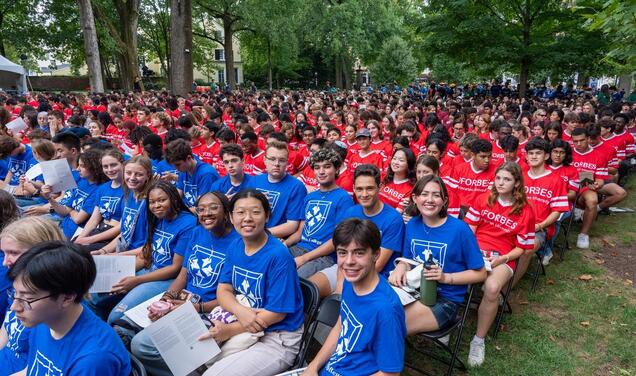
It’s not unusual to find Professor Robert George engaged in a dialogue about constitutional issues. For the McCormick Professor of Jurisprudence, it’s a major focus of his classes. A Sept. 5 forum in South Carolina, however, found George pressing five Republican presidential aspirants to articulate their constitutional principles.
The event, titled the Palmetto Freedom Forum, cast a national spotlight on the American Principles Project (APP), a nonprofit group that George founded in 2009 to represent “21st-century conservatism.” The APP sponsored the gathering, and George was one of the three panelists who questioned the candidates.
George, described as one of the country’s “most respected legal scholars” (in the words of Supreme Court Justice Elena Kagan ’81 in 2007) and a leading academic conservative, has stepped out of the classroom previously to engage in the political arena. He is chairman emeritus of the National Organization for Marriage, an advocacy group that helped underwrite a 2008 California ballot initiative prohibiting gay marriage. He also co-founded the Renewal Forum, a group that seeks to end sexual trafficking and, in 2009, drafted the Manhattan Declaration, a “Call of Christian Conscience” that advocates resistance, including civil disobedience if necessary, against legislation permitting abortion, same-sex marriage, or restrictions on religious freedom.
George said in an email that he founded the APP out of a belief “that the way forward for our nation, as we address the daunting and (in some cases) unprecedented challenges of the day, is not to look for new principles, but to rededicate ourselves to the principles of the American founding.”
The forum was designed to give candidates the opportunity to show “the depth of their understanding of our foundational civilizational and constitutional principles, and the strength of their determination to govern in line with those principles,” George said. The candidates all were asked the same questions and given time to deliver detailed answers and to respond to follow-up questions, a format that he termed “a successful experiment.”
George said he expects that the APP will play an active role in the 2012 campaign and may produce “independent, issue-oriented ads.” The group promotes an agenda that advocates, among other things, a return to the gold standard, cutbacks in public-sector pensions, and an end to federal funding of Planned Parenthood. An APP-sponsored “Innocence Project” seeks to curb governmental programs that members say denigrate the family or promote promiscuity.










4 Responses
Anthony Marcus *87
9 Years AgoLiberals and conservatives
I wonder if Professor Robert George’s views on such issues as abortion, gay marriage, public-sector pension benefits, and the gold standard are informed by his presumed expertise in jurisprudence (Campus Notebook, Oct. 5, and letters, Nov. 16). If not, I wonder whether he nevertheless invokes his Princeton credentials when holding forth on them. On the last of those issues, at least, he might benefit greatly from sitting in on an introductory economics course, and perhaps one on the history of the 1930s.
Fred Holzweiss ’54
9 Years AgoConservative values
There has been a trend over the years in PAW that is perhaps best illustrated in the Oct. 5 issue. You seem to refer to people as “conservative” when that is the case. That’s fine. But nowhere in the magazine do you refer to any others as “liberal.” In the article on Professor Robert George, he is so noted as a conservative. But in the same sentence, Supreme Court Justice Elena Kagan is not called a liberal. There are many other people discussed in this issue who also are well-known liberals, but not identified as such. Perhaps you could tell us why the conservative appellation is included, but never a liberal one.
Redmond Finney ’51
9 Years AgoConservative values
It was a most welcome and pleasant surprise to read in the Oct. 5 Campus Notebook section about the activities of McCormick Professor of Jurisprudence Robert George. Especially in light of the heavy liberal bias that exists on the current Princeton administration and faculty, it is refreshing to learn that “it’s not unusual to find Professor Robert George engaged in a dialogue about constitutional issues,” and that “it’s a major focus of his classes.”
Professor George also should be highly commended for founding the nonprofit group American Principles Project (APP) for the purpose of representing “21st-century conservatism.” In Professor George’s own words, he founded the APP out of the belief “that the way forward for our nation, as we address the daunting and (in some cases) unprecedented challenges of the day, is not to look for new principles, but to rededicate ourselves to the principles of the American founding.’” How can it be said any better than this!
I am happy that Professor George expects the APP to play an active role in the forthcoming presidential campaign through advocating conservative values, producing “independent, issue-oriented ads,” and seeking to curb what the APP believes to be harmful and unnecessary governmental programs and encroachments.
I urge Dr. George to include Princeton alumni in the communications of the APP, and would welcome the opportunity to support his extremely important work.
Anne El-Hinnawy ’05
9 Years AgoLiberals and conservatives
I was thankful to read Redmond Finney ’51’s letter in the Nov. 16 issue. However, I was confused by his comment about the “heavy liberal bias” of the University. The basic premise of science is that change is inevitable and in many ways, if understood, beneficial and revolutionary. We may consider “liberal bias” to be revolutionary in terms of the citizenship rights and alumni donations that allowed me to attend the University. We also may consider these values in terms of, for example, biology. It is a liberal idea that drives the belief that cancer has a cure and that we can find it. Once a person accepts that change happens and need not be catastrophe or chaos — as a rule, this is a liberal bias.
The liberal perspective toward change is intrinsic to higher education in the United States and for this, thank goodness. What are education, science, and governance if not the acceptance of the basic premise that change will happen and that we can have an impact on its direction? I rue the day when my alma mater or any other loses this bias. In its absence is the reproduction of the status quo, which while admirable as an ideal, requires us to ignore the watches on our wrists.